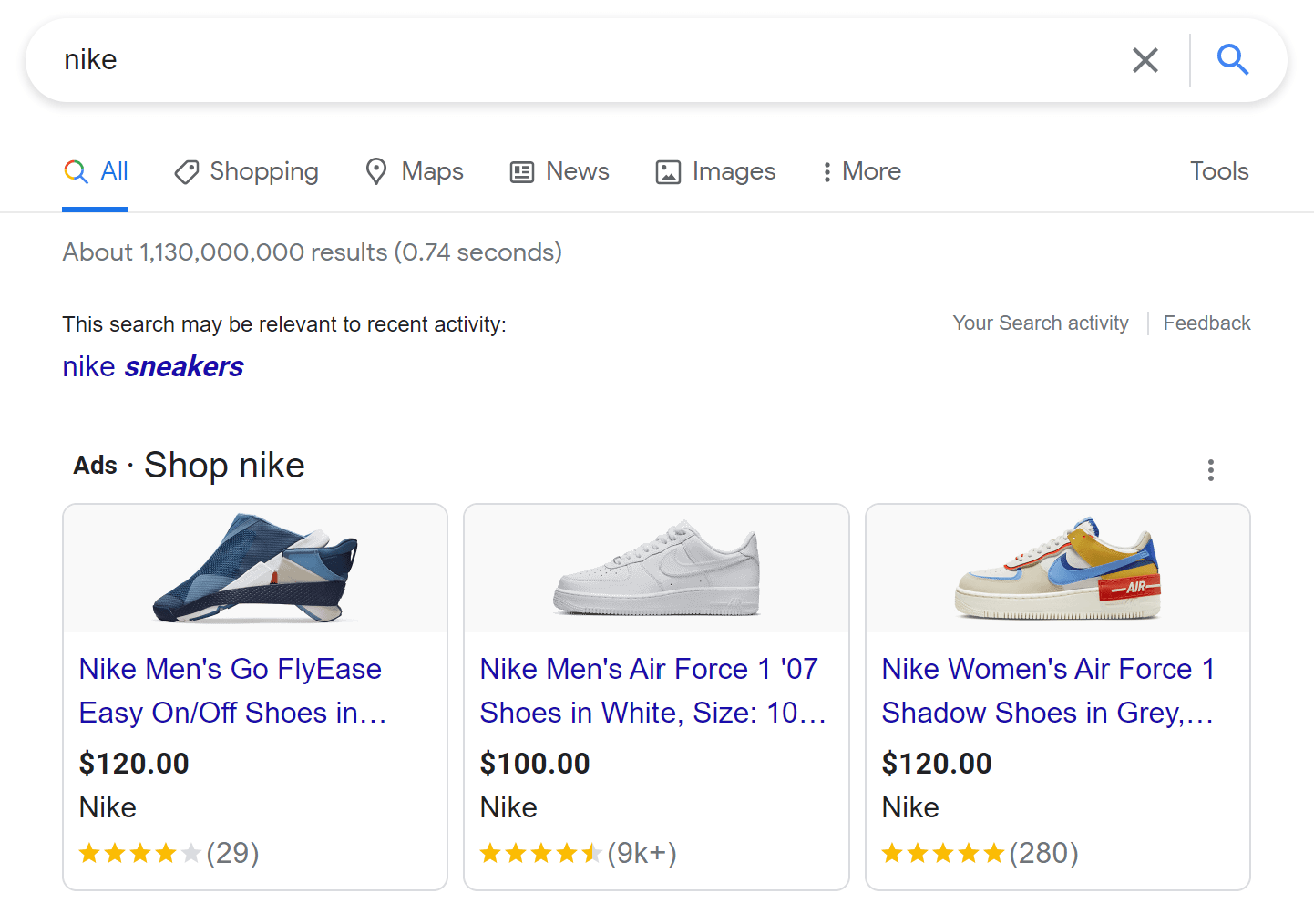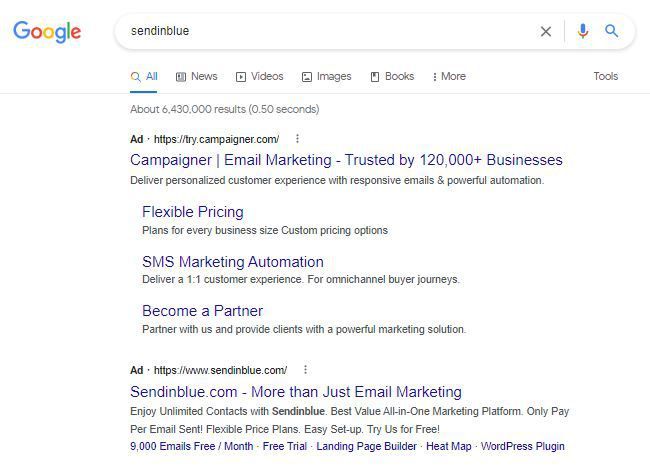PW Media | July 1, 2022
Are Competitors Worth Targeting in Your Search Strategy?
The benefits and risks of incorporating branded competitor keywords into your advertising strategies including proper techniques for doing so.
When maximizing your small business' exposure online, there's certainly no shortage of strategies to choose from regarding PPC, SEO, and other digital marketing channels. One strategy we get asked about often is whether you should target your competitor’s branded terms (a.k.a keywords).
In this post, we'll break down everything you need to know about targeting competitor branded keywords, including the pros and cons of using them and the best practices for incorporating them into your search strategy.
So let's get started!
What Are Competitor Branded Terms?
Let's quickly review what branded terms are in online marketing. Branded terms are words or phrases that refer to specific businesses, brands, or products. Generally, there are three kinds of branded terms:
- a business name
- a product name
- a business tagline
For example, the name “Nike” and the tagline “Just Do It” are branded terms associated with Nike, Inc. Targeting these branded terms with ads is an integral part of Nike's search strategy because it leads to a higher click-through rate (CTR) than targeting general search terms (such as “athletic sneakers” or “running shoes”) and improves the ROI of their search campaigns.

But would it make sense for a competitor (say, Adidas) to target these branded terms with ads? That's the question we'll be answering today!
What Does “Target Competitor Branded Terms” Mean?
Here’s the short answer: it means creating ads that specifically target your competitor's branded terms or keywords.
Look at the example in the image below. A user types into Google “SendInblue” (referring to the email marketing tool). The first thing you'd expect to see for a specific branded term is an ad for Sendinblue. And…nope. The first ad you see is for another email marketing tool called “Campaigner,” with compelling ad copy and well-utilized ad extensions that take up a third of the page.

This ad targets people who have searched for “Sendinblue” specifically. While you might think that this would be a wasted ad spend (after all, wouldn't these searchers just click on the Sendinblue result?), targeting competitor branded terms can be an effective way to reach new customers, especially if your ad, landing page, or website comes up before theirs!
What Are the Benefits of Competitor Keyword Targeting?
1) Growing Brand Awareness
Targeting competitor branded terms can help you effectively reach new customers who might not have heard of your business before or may not be entirely sold on the company they’re looking for. Showing up before your competitor in search can make potential customers take note and look into your brand further. If your ad provides an appealing alternative to the competitor's product, you could win over a new customer.
2) Less Competition for Cheaper Bids
Brand keywords are cheaper to bid on for Google search and display advertising, whether they are your own or those of a competitor.
3) Finding the Right Audience Fast
Finding qualified leads can be challenging. Piggybacking off a competitor's brand name with similar products and services can attract the exact audience with the intent to buy that you want to convert. Suppose you’re a new company in the digital realm. In that case, it’s much easier to be seen and remembered when you appear in search right below or above a more established company that’s done the heavy lifting in terms of online brand awareness and reputation.
What Are the Disadvantages of Competitor Brand Keyword Targeting?
Some search strategies are riskier than others. Sometimes significant risks can result in big results, sometimes not. Here are a few reasons to be cautious when implementing competitors' keywords into your search strategy.
1) It Can Get Expensive
While bidding on a competitor’s brand terms is completely fair game, it’s also completely fair game for them to bid on your brand terms. Two possible consequences can result: 1) Potential customers are steered away from your business toward your competitor, and 2) it may become more expensive to bid on their brand terms—and yours. Bidding on your own brand terms is usually a beneficial practice, so driving up the bidding cost of your brand terms and your competitor’s can be a lose-lose situation.
2) Low Click-Through-Rate (CTR)
You may get your ad in front of the audience you want, but that doesn’t mean they’ll click. A customer’s intent may not just be to buy those particular products, but they may only intend to buy them from that business. It is hard to convince brand fans to break with the business they like and trust. While it may seem like you’re saving money by planting that seed of recognition without having to pay for clicks, low CTR can damage your quality score. This may not be a great tradeoff if you are on a tight ad budget.
Pro Tip: Doing the math is key: If customers click on your ad 1 out of 10 times, is that lead worth the amount you paid for 10 clicks? Depending on the price of the product you’re selling, it may well be worth it.
3) Wasted Ad Spend
A customer searching for a competitor's brand name may already be working with that competitor and calling to follow up. If they click on your ad, there is very little likelihood that they will translate into a legitimate lead.
Best Practices for Targeting Competitor Branded Terms
Not knowing how to target your competitors’ branded terms can result in paying for disappointment, wasted ad spend, Google’s wrath, or even legal troubles. Here are some top tips for doing it right.
1) Know Who Your Competitors Are
Choose your enemies and battles carefully. If you’re a Japanese restaurant, there’s no need to target the Italian restaurant down the road. You want to target businesses of similar size with similar services and products that are taking business away from you. You may also want to rethink going against Goliath in the form of a large chain store like Home Depot or McDonald’s.
2) Be Careful with Your Ad Copy
Using competitor trademark keywords in your ad copy is a hard no. It’s terrible form and reflects poorly on your brand. Google will block ads that have trademarked terms in them. Competitors can also make a trademark complaint against you to have your ads removed from Google—or, worse yet, get a lawyer. There are exceptions, such as in the case of resellers, informational sites, or authorized advertisers. You can learn more about Google’s trademark ad policies here.
Pro Tip: Always trademark the name of your business. If you don’t, anyone can use your business’s brand terms in their advertising.
3) Ask Google To Block Certain Terms
When you're targeting competitor branded terms, you'll want to ensure you're not wasting money on irrelevant clicks. You can specify to Google which words or phrases you don't want your ad to show up for. For example, if you're a plumber targeting the branded keyword “Joe's Plumbing,” you might want to add “coupons” as a keyword to ignore. That way, you won't waste money on people who are looking for a “Joe's Plumbing” coupon who are not actually interested in your business.
4) Write Great Ad Copy Around Your Unique Selling Proposition (USP)
Before targeting competitor branded terms, it's important to identify your unique selling proposition (USP). This is the thing that makes your business different from and better than your competitors.
This competitive advantage will be different depending on your industry and target market. However, some examples of USPs include being cheaper, faster, or higher quality than the competition.
Once you've identified your USP, incorporate it into your ad copy to help you stand out from your competitors and convince searchers to click on your ad.
For example, if you're targeting the keyword Fred’s Plumbing and your USP is that you're cheaper, you might write an ad that says, “Expert Plumbing Repairs for Any Budget – Save 15% on Your First Service!”
The Takeaway
Targeting competitor keywords may help improve your SEO efforts—and can even lead to improved search engine rankings. Additionally, it can be an effective strategy in paid search, as long as you implement best practices. However, it's important to remember that finding and implementing competitor keywords is only one part of the puzzle and may not be the right strategy for every business.
Following these tips can help you target competitor branded terms with your ads and search strategy. Doing so will allow you to reach out to potential customers who might be interested in your business.
Contact Us!
If you're looking for help with your digital marketing strategy, PW Media can help! Our services include Pay-Per-Click (PPC), Search Engine Optimization (SEO), and more! Contact us today to learn more about how we can help you beat the competition through keyword research and competitor analysis. If you find that competitors are targeting you in their search strategy, we can help with that, too!

